Survey Says Parents and Teens Don’t Discuss Appropriate Online Behavior
Digital Well-Being
When we invested in our Digital Civility Initiative earlier this year, we did so with the goal of providing the Roblox community with the skills needed to create positive online experiences. Parents and caregivers play a key role in achieving this goal, so we committed ourselves to helping them learn more about the quickly changing digital world and how kids and teens behave in this world. That way, they can better understand where and when mentoring or oversight is necessary.
What’s clear is that kids growing up around technology today don’t distinguish between how they act or what they say online and in the real world. Digital life IS their real life. It makes no difference to them where they hang out with their friends. Simply checking in every day to see how your kids are doing and having conversations about their online world and behavior will help build a trusting and open relationship—meaning, most importantly, that they will come to you and ask for help when they need it.
We wanted to see if these conversations are actually happening between parents and kids. So, in October, we commissioned a survey via SurveyMonkey of 10,000 people in the U.S., including 3,571 parents of kids aged 7-17 (when kids are likely to already be online, playing and socializing), as well as 580 teens, asking them about their general online experiences.
Turns out, parents may think they’re talking to their children about appropriate online behavior, but that doesn’t match their kids’ reality. In our survey, 93% of parents say they talk to their kids about appropriate online behavior at least occasionally, but only 39% of teens agree. Conversely, the majority of teens (60%) say they “rarely,” “very rarely,” or “never” discuss this topic with their parents.
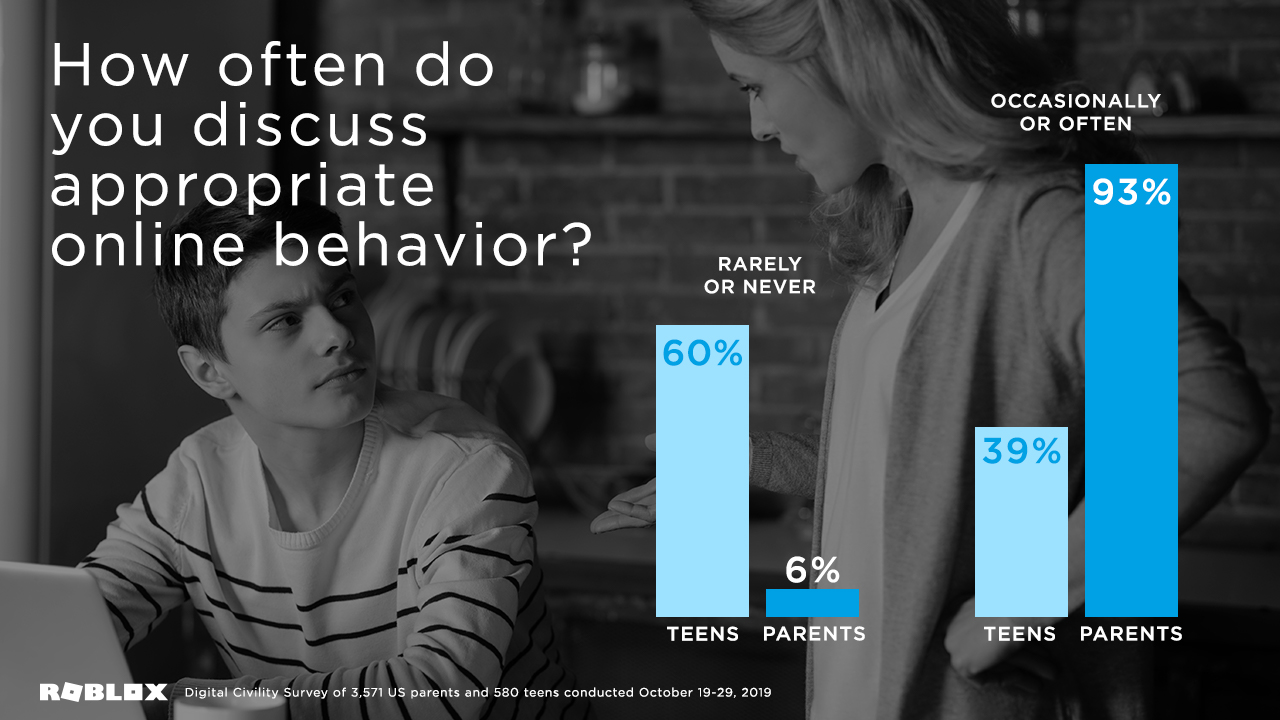
Parents who aren’t having conversations with their kids about appropriate online behavior shared assumptions that their kids already know what they’re doing or don’t need such conversations for a multitude of reasons (limited access to internet, no concerns being voiced, etc.). At the same time, parents are convinced their kids would turn to them for help if something bad, like online bullying, happens. Teens, on the other hand, are more likely to report their online bullying concerns to the platform or speak to another adult.
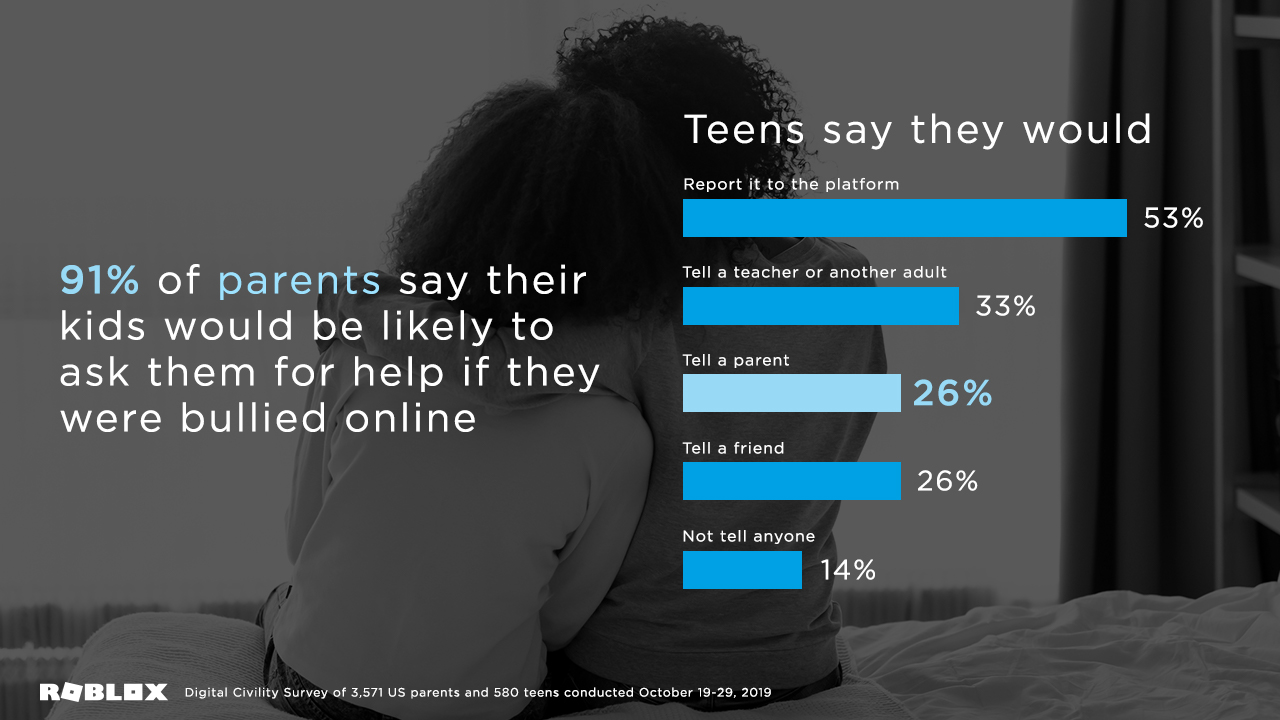
The survey questions got some parents thinking about whether it might be time to engage more:
“I guess it’s because [my son] has not voiced his concerns with regards to this subject. If he showed concerns, I would talk about it with him. Perhaps I need to be proactive.”
Millennial parents are more engaged than others
The majority of millennial parents (68%) are engaged in their kids’ digital lives, saying they are “very aware” of what their child does online; a lot fewer Gen X and Boomers said the same (48% and 47%, respectively).

Millennial parents are also more likely to play video games with their kids—37% are involved in play compared to 29% of Gen X and 24% of Boomers.
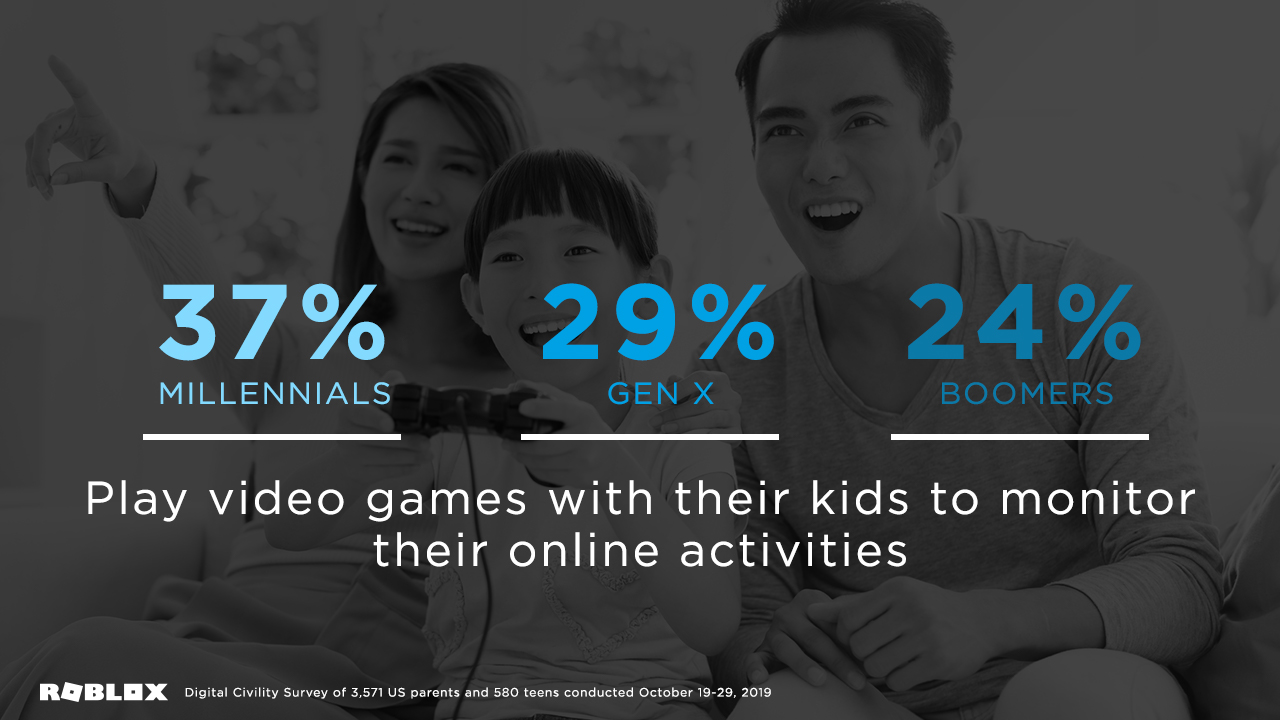
Research shows time and time again that parents who are joining in on their children’s digital world by playing together with them have a unique opportunity to really understand what kids and teens are experiencing online—which in turn also helps to develop open communication and proactively resolve potential issues and concerns from both sides. In our survey, 68% of millennial parents say their kids are “very likely” to turn to them for help (compared to 59% for Gen X and 58% for Boomers who seem to be less confident about that).
How big of a problem is online bullying exactly, and what does it look like for teens who are experiencing it?
October was National Bullying Prevention Month in the U.S., and next week the U.K. will be raising awareness about this issue as part of Anti-Bullying Week. I’m also presenting at the 2019 International Bullying Prevention Conference this week so we wanted to understand how much of a problem online bullying is according to parents and teens.
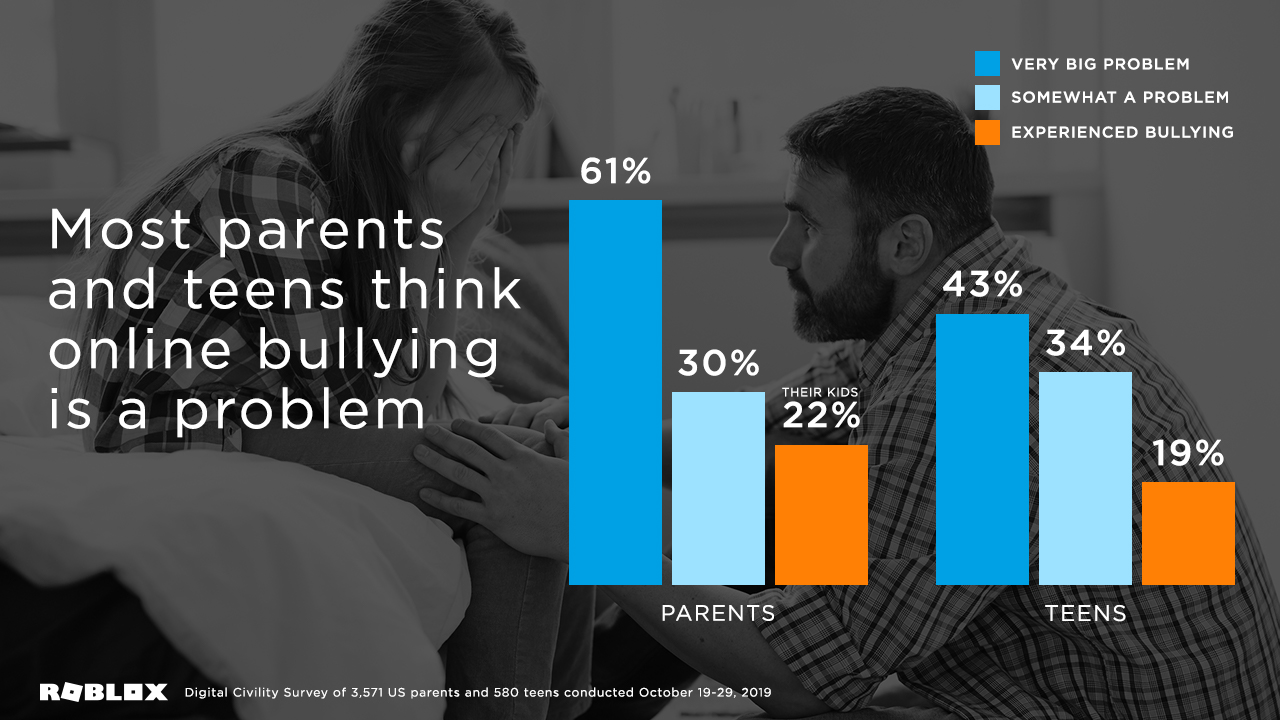
The vast majority (91%) of parents see it as a problem for young people today, and fewer—but still a majority (77%)—of teens agree. Twenty-two percent of parents shared that their children have personally experienced online bullying, and in the majority of those cases (66%) bullying occurred more than once, and in 47% of cases the bullying was severe. Nearly 1 in 5 (19%) of teens confirmed they’ve personally experienced online bullying in the past 12 months.
We also asked teens to share what they considered bullying while playing online games. For half of them, making fun of someone in comments is bullying and 42% think it’s calling someone a rude name or encouraging players to target others in a game (Note: the common definition of bullying implies that repeated negative behavior that is intended to make others feel upset, uncomfortable, or unsafe).
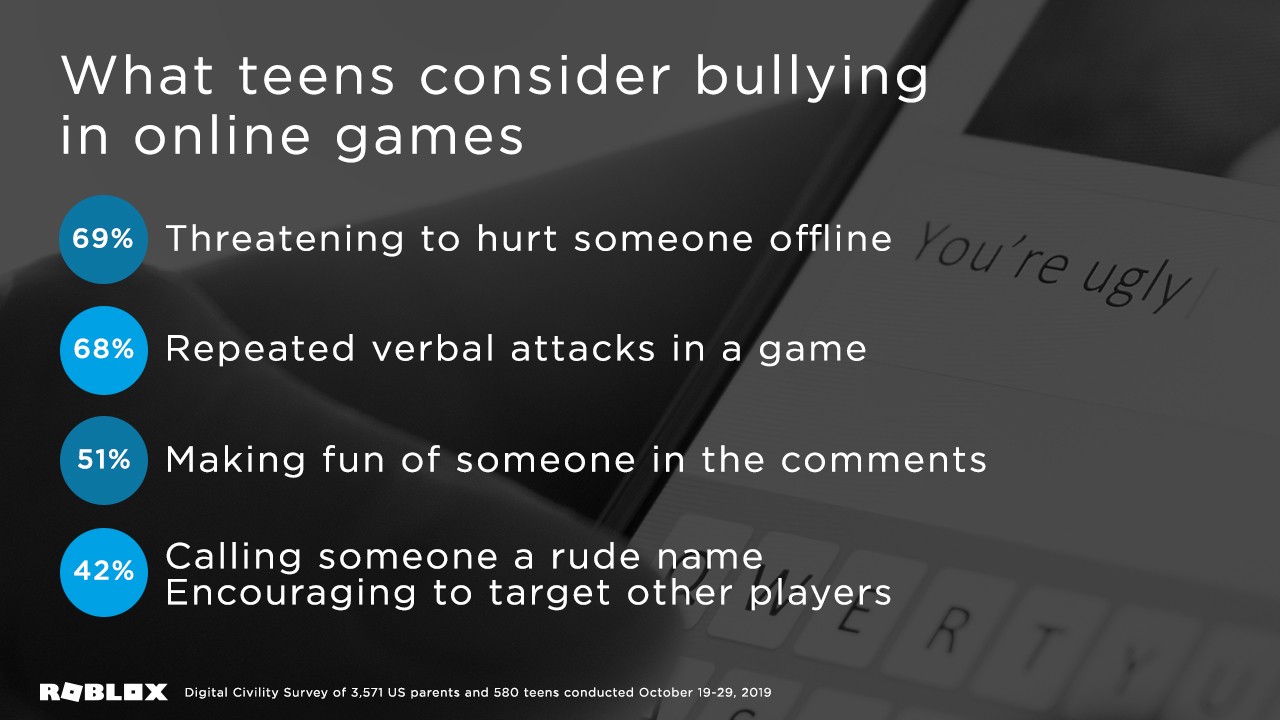
This data offers several important insights for parents and caregivers. First of all, if a child comes to you with a problem like online bullying, you need to understand what exactly happened and the severity of the situation. Listen with empathy: if there’s no judgment (no matter what happened), you’re setting a precedent that your door will always be open, which will serve you (and your kids) well in the real world, too.
A proactive conversation—even if no concerns are being voiced—is always best: it gives you an opportunity to prepare kids before they go online and make sure they understand how easy it is for people to say things when they are “behind a screen.” Older kids can also offer great advice to their younger peers—for example, teens in our survey had some words of empowerment for their younger peers who may experience online bullying: “Anonymous strangers can’t hurt you. Block or report them, and if they try to circumvent it, then ignore it,” and “Speak up; don’t be afraid to get help.”
And some good news, finally
Some encouraging numbers showed us what “nice” actually looks like online: nearly all teens in our survey (96%) say they’re likely to help a friend they see being bullied online. The majority of teens playing online confirmed they get help from other players when they need it at least “sometimes,” with 41% who said “often” and “always.” Looks like many kids already think that it’s cool to be kind, and that’s the trend we love to see. And for parents—these survey results might serve as a great conversation starter. Ask your child today what kind of behaviors they consider to be “cool” or “not cool” when playing online, and you might be really surprised with what you learn!
Methodology: This online poll was commissioned to SurveyMonkey as part of Roblox’s Digital Civility Initiative and conducted October 19-29, 2019 among 10,000 U.S. adults, including 3,571 parents of children age 7-17 (922 of them are millennials) and 580 teens, 430 of whom play online games once a month or more. Respondents for this survey were selected from the more than 2 million people who take surveys on the SurveyMonkey platform each day. Data have been weighted initially for age, race, sex, education, and geography using the Census Bureau’s American Community Survey to reflect the demographic composition of the United States age 13 and over, then weighted for age, race, sex, education, employment status, and geography using Census Bureau’s Current Population Survey to reflect the demographic composition of the United States employed population. Full data can be reviewed here.